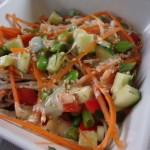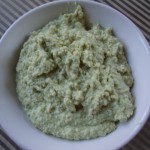Do You Think It’s Expensive To Go Veg?
I’m often asked (and it’s often implied) if going veg is more expensive and if cooking is more time consuming. With the costs of food going up and up, especially organic, you’d think it would be, but surprisingly, I have found that I don’t spend any more money than I did when we ate meat. Granted, there’s only three of us, minus the dog (he’s not big on tofu. He prefers Coronas):
I do find, however, that because I buy fresh food, I go to the store more often–no more just once a week trips for me, but since I live so close to several stores, I’m ok with it. So here’s what I attribute the low costs to:
Meat alternatives costs are comparable to the real deal. 14 ounces of tofu costs me roughly $1.99-2.50 and that feeds my family. Lunch “meats”, Boca Crumbles, tempeh and veggie burgers doesn’t cost me more than $5 to feed the three of us. My favorite, Field Roast, may be the exception at about $6.75-7 for a pound, but again, it’s enough for us.
I buy fruits and veggies that are in season and on sale. I’ve also just joined a Community Supported Agriculture (CSA) which comes from an organic farm and for what I’d spend in a month on produce, I get three months with a CSA. Not only am I getting fresh, organic produce, I’m supporting a local farm.
I grow my own herbs. I’m no green thumb (the Husband is in charge of the houseplants) but when it comes to vegan cooking, I use a lot of herbs, especially cilantro, parsley and rosemary. So for about $1.99-2.50 a plant at Home Depot, I picked up my favorite herbs and planted them in pots. Voila!
Bulk up. All those bins in the health food store are actually big money savers. Since there is no need for that fancy packaging, we get a break at the register. Try buying pasta, quinoa, flours, nuts, etc. from the bulk bins and you’ll be surprised at how much you save. Same with spices. Many stores offer bulk spices and you can just buy what you need. (Why again, do I have a full jar of celery salt)?
Get used to leftovers and freeze what you don’t eat. I have a cupboard full of reusable containers and I love them. (I’m also in love with my label maker, but I refrain from labeling leftovers). I’ll make a big salad at the beginning of the week and munch on it all week. Or when I make my favorite Cashew Cheese sauce, I’ll freeze it into smaller containers, same with pesto, or bake some tofu slices for sandwiches. . .you name it.
Can you do the can-can? Buying beans in the can will save you a bundle as well and one can can supply enough protein for two meals. Gotta love that.
Be a coupon queen (or king). Yep, I clip and organize my coupons! Sign up for Mambo Sprouts, where they’ll send you coupons via snail mail or email for natural foods. Many stores also will double the coupon values, so look for those stores and/or certain days they offer that.
There are lots of ways to save money on vegan food—it just takes some planning. Once you get into the groove of things, you’ll start seeing a difference in your wallet.
So what do you think? Do you spend more to be vegan? What are your money-saving tips?
Source for some of the info: VegNews April 2010
Are Veggies Losing Their Mojo?
According to researchers, they are. Donald Davis, a PhD researcher with the Biochemical Institute at the University of Texas has determined that broccoli, for example, had 130 mg of calcium in 1950, but today, it only has 43 mg. Yikes!
The culprit? Apparently, it’s the farmer’s desire for bigger, faster-growing vegetables. They use synthetic fertilizers. The solution? Buy organic. I know, I know, organic can be pricey, so Prevention magazine (where the info is from) did a nice handy-dandy list of ways to still reap the benefits of veggies while buying the conventional ones.
Sleuth out strong colors. Look for bold and bright hued produce, like red leaf lettuce versus iceburg lettuce.
Pair your produce. Power in numbers, folks. Some veggies work better when paired with another. For instance, eating tomato-based salsa and avocado upped the body’s absorption of the tomato’s cancer-fighting lycopene.
Buy smaller items. Size matters (when it comes to veggies 😉 ) The smaller the fruit, the more concentrated the nutrients will be.
Pay attention to cooking methods. Certain veggies release more nutrients when cooked. Broccoli and carrots are more nutritious when steamed then when raw or boiled. Tomatoes release more lycopene when slightly sauteed or roasted.
Keep produce whole. Don’t buy bagged salads, carrots and other veggies. The peeling and cutting can sap nutrients. Even though it can be a time-sucker, you’ll be missing out on what you’re hoping to get from the vegetables in the first place!
Look for new colors. Try purple asparagus or cauliflower. Switch from green peppers to red, orange or yellow. In general, the more varied your diet, the more vitamins and minerals you’ll get.
Opt for old-timers. Heirloom varieties like Brandywine tomatoes, Early Jersey Wakefield cabbage, Golden Bantam corn, or Jenny Lind melon were bred before WWII and are naturally hardier because they have endured and thrived long before modern fertilizers and pesticides.
Find a farmers’ market. Every spring, I can’t wait to grab my reusable bags and head over to the different farmers’ markets. Stuff is in-season, usually organic and you support a local farmer! It’s a win-win.
Source: Prevention July 2010
We all love animals. Why do we call some “pets” and others “dinner?”
-K.D. Lang










Oh I am keeping this one for a quick look-see before I hit up the grocery store tonight… 😉
Great post on the prices and everything! 🙂 It can be confusing when trying to come up with meal ideas without “the star of the dish” being involved, but it sure gets easier with time!
I have had meat here and there in the past month or two, but it’s been limited to once a week as I gradually re-cut it out of my daily intake…
I still can’t seem to get into tofu…
By the way, I love that quote..
My husband and I were weary on tofu at first, but it’s pretty amazing what can be done with it. It takes some trial, error and just getting used to, I think.
When my family switched to a vegan diet we figured that we actually saved $20/week in groceries. It’s amazing how much you can save once the meat is out 🙂 Thanks for this post.
That’s great! I think some people think that you have to eat organic if you go veg, (which is great to do whether you’re a vegetarian or not) and people attribute the costs of organic products/produce when they assume a veg diet is more expensive. $20 a week adds up!
…and P.S. I don’t think I ever told you that I tried your cashew mac & cheese recipe. It was amazing!! It was so good that I posted about it in my other blog “The Veggie Roll Call” Taste Test Tuesdays!! http://www.theveggierollcall.wordpress.com My little girl couldn’t stop asking for more…it was a good thing we had left overs for 3 days 🙂
I’m so glad you liked it! It’s such a favorite at my house. 🙂
I think we are saving money as vegetarians. We buy a lot of dried beans, which is a great, inexpensive protein source. And then of course, all those yummy grains. Thanks for your cost breakdown and advice!
I think you can save money and be vegan. We are not a vegan household but when I really examine our food bills, it’s certainly not our CSA or other veggie purchases that are driving it. As Monet says, with dried beans and grains and a CSA, I think our food bill is very manageable.
Yes, it definitely can be done. I think there is certainly some planning and lots of research involved, but it can easily be done. 🙂
Thank you for all of this wonderful information; it is good to have all of this in one convenient place to bookmark.
Since I’ve been placing the cost with each meal over at the Weekly Vegan Menu, it turns out that for our family of 5 (with two teens – it makes a difference!), the average we spend on a meal is $10. And there are many times we have leftovers for ‘Leftover Meals.’
I’ve seen shows/blogs where the goal is to have a meal be around $10 for meat-eaters, so I’m assuming that our humble family’s organic, vegan diet seems to be at par with the ordinary American diet. In perspective, if you go to a fast food place and order off their $1 menu, getting 5 burgers, maybe 2 sodas and 3 fries, that is $10. And it sucks.
Overall, I think being healthy, organic vegans is better for my family, the animals, and the Earth. Can’t really argue with that.
Well stated. Even if it did cost more, I wouldn’t care. I feel so strongly about feeding my family clean, nutritious food that isn’t loaded full of cancer-causing ingredients, that I’d pay anything.
And actually, one of the things I meant to address in this post, but forgot to, is how much faster dinner is made. Meat takes a while cook, while with meat alternatives, it’s usually just a matter of heating them up. Many vegan recipes will have lots of ingredients, but they’re usually just seasonings, and considering how quickly the meals cook, having a long list of ingredients is no biggie whatsoever.
I’m glad that so far, many of you have noticed going veg isn’t expensive. Of course, if you’ve seen Food Inc, you saw the family who couldn’t afford fresh produce, but could easily afford items off the dollar menu at McDonald’s. It’s sad and changes need to be made.
Thanks, April! I love this article, by the way. Very informative.